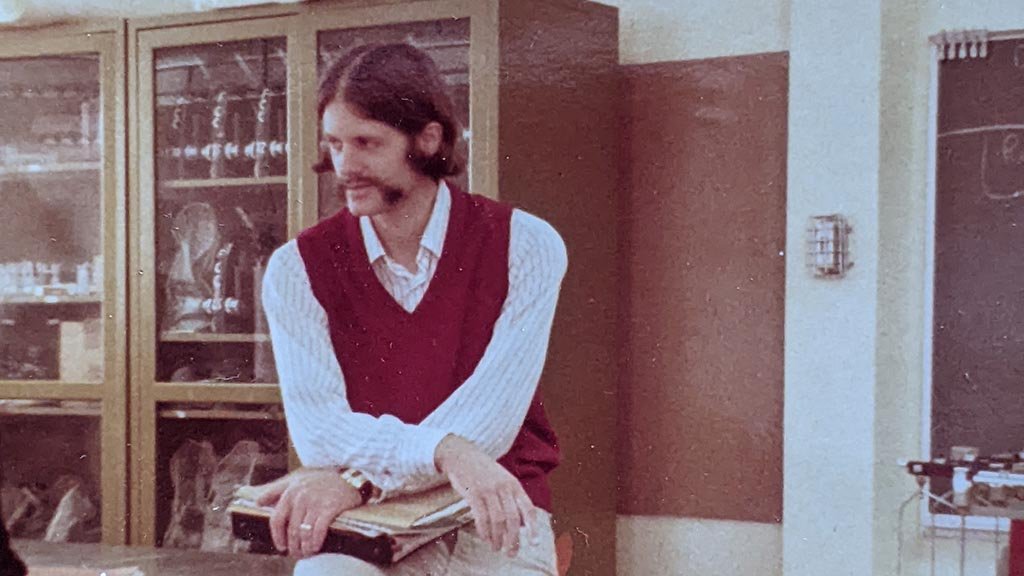Graduate Fellowships
Building Bonds Between Science and Social Responsibility

A gift from the family of the late alumnus Jim Preer helps strengthen the Division of Chemistry and Chemical Engineering’s efforts to support extraordinary scholars from all backgrounds and perspectives.
After Jim Preer (PhD ’70) passed away in July 2020, the Preer family knew they wanted to honor his life of service. Civil rights protests, including Black Lives Matter demonstrations, were happening around the globe, and many institutions were reevaluating their commitment to diversity, equity, and inclusion (DEI).
“Jim’s death gave us a chance to reflect on his life and what had been important about what he had done,” says his wife, Jean Preer, who, along with their children, Genevieve and Shelly, has made a gift of $100,000 to advance DEI in Caltech’s Department of Chemistry and Chemical Engineering (CCE). “There were conversations everywhere about racial justice, and we wanted to honor the ways in which Jim's work had fit into that effort.”
After earning a doctoral degree in chemistry under the guidance of Harry B. Gray, the Arnold O. Beckman Professor of Chemistry and founding director of the Beckman Institute, Jim Preer was granted conscientious objector status during the Vietnam War. This allowed him to complete alternative service as a Woodrow Wilson Foundation Teaching Intern at Federal City College, a newly established, open admissions, predominantly Black institution now the University of the District of Columbia (UDC).
Following his internship, Preer remained on the faculty at UDC for more than 30 years. Among many activities, he involved students in research on lead and other heavy metals in urban gardens, organized the campus Earth Day observance, and led a field ecology course that was honored by the U.S. Department of Agriculture for increasing minority representation in science.
“Jim had dual interests: He loved science, but he also had a very strong sense of social responsibility,” Preer says. During the couple’s years at Caltech in the late 1960s, she remembers picketing with Cesar Chavez’s farm workers as well as tutoring students through the campus Y. Before leaving for DC, the couple spent time with two students from historically Black colleges and universities (HBCUs) who were summer research scholars in Gray’s laboratory. “So, when I read on the Caltech website that Harry Gray was involved in current diversity efforts, I was excited. I contacted Harry, who encouraged our family to think about what we really wanted to accomplish.”
Gray put Preer in touch with Brian Stoltz, the Victor and Elizabeth Atkins Professor of Chemistry and an investigator with the Heritage Medical Research Institute. Stoltz also chairs CCE’s DEI committee and oversees the division’s DEI efforts.
Catalysts for Creative Solutions
Like the Preer family’s motivation to give, “many of our recent activities were fueled by George Floyd’s murder,” Stoltz says. “Students were galvanized. We decided the faculty should respond right away.”
Along with a handful of other faculty, staff, and students, Stoltz formed a committee to take a bottom-up approach to DEI. This meant asking individual research groups to submit proposals for making the division a more inclusive place.
“As researchers, we are trying to solve the most difficult problems in the universe,” Stoltz says. “To succeed, we need a lot of creative ideas. We need to have the broadest, most diverse group of people to grab those great ideas and execute them into solutions.”
To bring this vision to fruition, Dennis Dougherty, the George Grant Hoag Professor of Chemistry and holder of the Norman Davidson Leadership Chair in CCE, provided seed money for a divisional DEI fund. Several faculty members also contributed using their own discretionary accounts.
Initiatives supported to date include travel grants, fellowships, and a virtual conference called Future Ignited that connects students of color with current graduate students to learn more about research opportunities in chemistry as well as life at Caltech.
Building an Inclusive Community of Chemists
For Arianne (Ari) Hunter, the recipient of a Presidential Postdoctoral Fellowship, coming to Caltech and CCE represented a chance to return to academia and organic chemistry after conducting forensic analysis on evidence retrieved by U.S. soldiers in Kuwait. She also looked forward to meeting Nobel laureate Bob Grubbs. Known for both his scientific accomplishments and the nurturing relationships he formed with mentees, Grubbs sadly passed away before Hunter arrived on campus.
“I wish I’d had the chance to learn from him,” says Hunter, who studies synthetic organic electrochemistry and data chemistry in the laboratory of Sarah Reisman, Bren Professor of Chemistry. “But I’ve been welcomed with open arms by professors like Sarah, Brian Stoltz, and Bil Clemons. They are keeping Grubbs’s legacy of mentorship alive. Without the Presidential Postdoctoral Fellowship, I wouldn’t have had the opportunity to learn from these distinguished scholars.”
Inspired by the Institute’s initiatives to bring a more diverse group of exceptional students to campus, the Preer family decided to fund nine WAVE fellowships that will enable chemistry majors from HBCUs to spend a summer working in a Caltech chemistry lab. This summer, two CCE WAVE fellows are visiting from Central State University and Jackson State University.
With Assistant Professor of Chemistry Scott Cushing, the Preers also helped fund a “near-peer” mentorship and outreach program called Caltech Connection. The program pairs graduate students and postdoctoral scholars with undergraduates from local minority-serving colleges who are interested in attending Caltech. Currently in its third year, Caltech Connection received 150 applications for 50 spots and has grown from 11 mentors and 11 mentees to 50 mentors and 50 mentees today.
“What I found most inspiring was that Caltech already had a structure to support diversity,” Preer says. “Instead of starting from scratch, we are building on something the Institute is committed to doing.”
This archived content may contain outdated information or references that may not reflect current practices or programs.